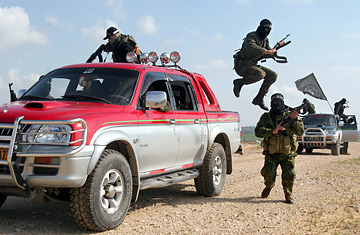
A masked Palestinian militant from a wing of the Popular Resistance Committee linked to the Fatah movement, leaps from a truck as he and others take part in a training display in Gaza City, Friday, Feb. 16, 2007.
The seeds were planted by Yasser Arafat. When he ran the Palestinian Authority, Arafat's ruling philosophy involved playing numerous security forces against each other, so no single one could ever become too powerful. The result: several organizations, no clear hierarchy, a lot of guns and a lot of people with interests they want to protect. Hamas has its own forces, too, including its powerful Executive Force and the Izzadine al Qassam Brigades. Then there are other insurgent groups and numerous clans, gangs, and families with their own militias and interests, ranging from offering protection to taking revenge, from committing crimes to firing rockets at Israel. (Much of the recent violence in Gaza was clan-related.) Whatever their motives, says Nicholas Pelham, Senior Middle East Analyst with the International Crisis Group, "there are too many forces that are loyal to a faction or a family and not the Palestinian Authority."
The Mecca deal stipulates that Hamas gets to choose the Minister of the Interior. The leading contender, Hamas spokesman Ismail Radwan told a Palestinian radio station, is a retired Brigadier and security force veteran named Hammoudeh Jerwan. If he gets the job, Jerwan will have to force all of these groups to fall into line (except for the Presidential Guard and the Intelligence force, which stay under the President's office). That means taking on the heads of the various organizations, several of whom have grown rich off their posts. These are men who can buy loyalty and manpower and who have served as Abbas's bulwark against Hamas over the past year. A member of Fatah's own Central Committee, who did not want to be identified, says, "If the government wants to achieve internal security, the first step should be sacking all the heads of the security organizations in the West Bank and Gaza, because those men are responsible for the clashes that have been taking place. But would [Abbas] be ready to change the heads of security? I doubt it, because they are his allies."
More broadly, says Hamas spokesman Hamad, a sense of "internal harmony" must be restored, a nearly impossible task given the lack of trust between parties. Hamas leaders think Fatah officials are too close to the Americans and Israelis. They openly voice suspicions that Mohammed Dahlan, the head of Preventative Security, is working with the U.S. and Israel to topple the Hamas government. Meanwhile, Fatah charges Hamas with taking money and direction from Iran and Syria (where Hamas leader-in-exile Khaled Mashal is based). The distrust is endemic. Neither Fatah nor Hamas trusts Israel. Israel trusts neither. On top of that, the Egyptians are reportedly peeved because the Saudis brokered the deal and took the glory for themselves. Discord exists within the Palestinian factions themselves. "The fighting on the ground raised the question of how much the political leadership can control their own military wings," says Pelham.
Should these problems get sorted out, another moment of judgment will arrive. Says Hamad: "We will have to find a way to market this government on the international level, to the U.S. and Europe, to see if they will recognize it and deal with it." The Quartet that is overseeing the negotiations — the U.S., Britain, Russia, and the U.N. — has set up several conditions for Hamas: recognition of Israel, disavowal of violence, and recognition of all past agreements with the Jewish state. Hamas leaders have thus far tried to cobble together an acceptable formulation, saying their members in government would recognize past agreements, which implicitly recognize Israel, and that Hamas as an organization would, if Israel withdrew to the 1967 borders, be willing to sign an extended truce. But Mashal and others have repeatedly ruled out explicit and unconditional recognition.
With reporting by Jamil Hamad
